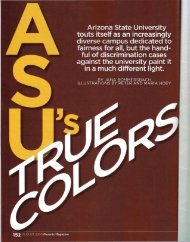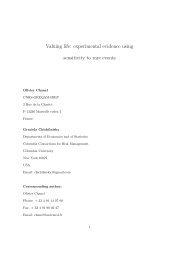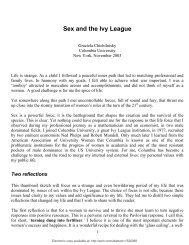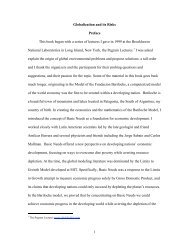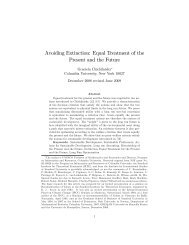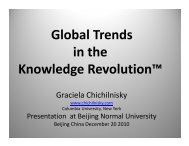The Limits of Mathematics and NP Estimation in ... - Chichilnisky
The Limits of Mathematics and NP Estimation in ... - Chichilnisky
The Limits of Mathematics and NP Estimation in ... - Chichilnisky
- No tags were found...
Create successful ePaper yourself
Turn your PDF publications into a flip-book with our unique Google optimized e-Paper software.
<strong>The</strong> <strong>Limits</strong> <strong>of</strong> <strong>Mathematics</strong><strong>and</strong> <strong>NP</strong> <strong>Estimation</strong> <strong>in</strong> Hilbert Spaces 13<strong>The</strong> <strong>Limits</strong> <strong>of</strong> <strong>Mathematics</strong> <strong>and</strong> <strong>NP</strong> <strong>Estimation</strong> <strong>in</strong> Hilbert Spaces15<strong>in</strong> the previous Section. <strong>The</strong> constructibility <strong>of</strong> purely f<strong>in</strong>ite measures has been shown <strong>in</strong>turn to be equivalent to the existence <strong>of</strong> "ultrafilters", to Hahn Banach’s theorem <strong>and</strong> theAxiom <strong>of</strong> Choice <strong>in</strong> <strong>Mathematics</strong>, <strong>Chichilnisky</strong> (2009, 2010a, 2010b). Furthermore, the Axiom<strong>of</strong> Choice was established by K. Godel early on to be <strong>in</strong>dependent from the other axioms<strong>of</strong> <strong>Mathematics</strong> (Godel (1943)), so there is a formulation <strong>of</strong> <strong>Mathematics</strong> with the Axiom <strong>of</strong>Choice <strong>and</strong> another without it, both are equally valid. This Axiom <strong>of</strong> Choice itself is thereforean unprovable proposition from the other axioms <strong>of</strong> <strong>Mathematics</strong> - thus provid<strong>in</strong>g a l<strong>in</strong>k withthe ambiguity feature <strong>of</strong> large logical systems that was first identified by K. Godel last century(1943). Equally the two separate <strong>and</strong> dist<strong>in</strong>ct mathematical systems - one with <strong>and</strong> the otherwithout the Axiom <strong>of</strong> Choice – are equally valid <strong>and</strong> they are contradictory with each other.<strong>The</strong>refore there exist mathematically <strong>and</strong> logically correct statements that are contradictorywith<strong>in</strong> the classic body <strong>of</strong> <strong>Mathematics</strong>. <strong>The</strong>se statements confirm K. Godel’s <strong>in</strong>completenesstheorem for <strong>Mathematics</strong>.More precisely, the formal equivalence we are seek<strong>in</strong>g between the results <strong>of</strong> this chapter<strong>and</strong> the <strong>Limits</strong> <strong>of</strong> <strong>Mathematics</strong>, has been established <strong>in</strong> the previous Section <strong>of</strong> this chapter,where a l<strong>in</strong>k was established to <strong>Chichilnisky</strong>’s axiom <strong>of</strong> "Sensitivity to Rare Events" - which,<strong>in</strong> <strong>Chichilnisky</strong> (2009, 2010a, 2010b, 2011), was proven to be identical with the negation <strong>of</strong> theAxiom <strong>of</strong> Choice.<strong>The</strong> literature on the <strong>Limits</strong> <strong>of</strong> <strong>Mathematics</strong> that was <strong>in</strong>itiated by Godel, is deeply connectedtherefore with the results on the <strong>Limits</strong> <strong>of</strong> Econometrics presented <strong>in</strong> this chapter.13. ConclusionsWe extended Bergstrom’s 1985 results on <strong>NP</strong> estimation <strong>in</strong> Hilbert spaces to unboundedsample sets, us<strong>in</strong>g previous results <strong>in</strong> <strong>Chichilnisky</strong> (1976 <strong>and</strong> 1977). <strong>The</strong> focus was on thestatistical assumptions needed for the extension. When estimat<strong>in</strong>g an unknown function onthe positive l<strong>in</strong>e R + , we obta<strong>in</strong>ed a necessary <strong>and</strong> sufficient condition that derives from aclassic assumption on relative likelihoods, SP 4 <strong>in</strong> De Groot (2004).We extended assumptionSP 4 , <strong>and</strong> therefore the results, to any unknown cont<strong>in</strong>uous function f : R + → R. Wealso showed that the SP 4 assumption is equivalent to well known axioms for choice underuncerta<strong>in</strong>ty, such as the Monotone Cont<strong>in</strong>uity Axiom <strong>in</strong> Arrow (1970), Insensitivity to Rare Events<strong>in</strong> <strong>Chichilnisky</strong> (2000, 2006), <strong>and</strong> to criteria used for susta<strong>in</strong>able choice over time, such asDictatorship <strong>of</strong> the Present (1996).When the key assumptions fail, the estimators on bounded sample spaces that are based onFourier coefficients, do not converge. We showed that this <strong>in</strong>volves ‘heavy tails’ <strong>and</strong> purelyf<strong>in</strong>itely additive measures, thus suggest<strong>in</strong>g a limit to <strong>NP</strong> econometrics.14. Footnotes1. In 1980 Rex Bergstrom <strong>and</strong> I discussed Hilbert spaces at a Colchester pub at a time he <strong>of</strong>feredme the Keynes Chair <strong>of</strong> Economics at the University <strong>of</strong> Essex, which I accepted. Bergstromwas <strong>in</strong>terested <strong>in</strong> my recent work <strong>in</strong>troduc<strong>in</strong>g Hilbert <strong>and</strong> Sobolev Spaces <strong>in</strong> Economics(<strong>Chichilnisky</strong>, 1976, 1977) <strong>and</strong> I suggested that Hilbert Spaces were a natural space to use<strong>in</strong> <strong>NP</strong> Econometrics, which apparently <strong>in</strong>spired his 1985 chapter. Bergstrom passed away <strong>in</strong>2006, <strong>and</strong> his former student Peter Phillips organized this conference <strong>in</strong> his honor. This paperis <strong>in</strong> honor <strong>of</strong> a great man, <strong>and</strong> attempts to complete a conversation between us that was leftpend<strong>in</strong>g for 27 years.



